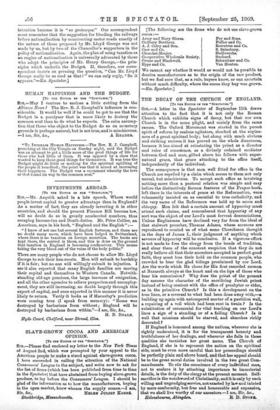THE DECAY OF THE CHUJtCH OF ENGLAND.
[To TH2 EDITOR OF THH " SPECTATOR:9 SIR,—A letter in the Spectator of September 11th draws attention to the fact that it is not only the Roman Church which exhibits signs of decay, but that our own Church is in the same plight, and mainly from the same causes. The Oxford Movement was started in the purest spirit of reform by zealous agitators, shocked at the supine- ness of a great spiritual body; but along with much obvious and striking success it has proved on the whole disastrous, because it has aimed at reinstating the priest as a director and ruler of conscience, as a divinely ordained mediator between God and man, gifted above his fellows with super- natural grace, that grace attaching to the office itself, independently of the individual.
The consequence is that men well fitted for office in the Church are repelled by a claim which seems to them not only unreal, but mischievous. To accept such office as involving nothing more than a pastoral relation was simple and easy before the distinctively Roman features of the Prayer-book, left there in the interests of peace at the Reformation, were vehemently insisted on as essential to true catholicity, and the very name of the Reformers was held up to scorn and obloquy. Men felt that a certain amount of hypocrisy must attend such claims, and remembered that hypocrisy of any sort was the object of our Lord's most fervent denunciations. Unless Englishmen have declined very far from the ideal of that stalwart preacher, Thomas Adams, whose sermons are reproduced to remind us of what some Churchmen thought in the days of James I., their judgment of anything which savours of hypocrisy will be conclusive. If a vigorous effort is not made to free the clergy from the bonds of tradition, and clear them of the constant suspicion that they do not really believe all that their ancestors accepted in perfect good faith, they must lose their hold on the common people, who crowded to hear the glad tidings proclaimed by our Lord. Are the words which He chose for His first recorded sermon at Nazareth always at the heart and on the lips of those who bear his commission? Why does the priest of the present day assume the character of the sacrificing Jewish priest instead of being content with the office of presbyter or elder, as in the primitive Church? Is this a development on the true lines, or a reversal to what had been done away with,—a building up again with untempered mortar of a partition wall, a repairing of a veil which had been rent in twain ? Is the substitution of ceremonial for vital teaching on our Lord's lines a sign of a standing or of a falling Church P Is it well that missions should be starved, and churches richly decorated P
If England is honoured among the nations, wherever she is rightly understood, it is for the transparent honesty and truthfulness of her dealings, and wherever she fails in these qualities she tarnishes her great name. The Church of England, if she is to represent the nation on the spiritual side, must be even more careful that her proceedings should be perfectly plain and above board, and that her appeal should be to the great moral duties involved in the two great Com- mandments. To stir the conscience of every individual man, not to enslave it by attaching importance to immaterial details, is the duty of the clergy at the present moment. Self- sacrifice is the watchword of Christianity, and it is only by such willing and ungrudging service, not exacted by law and tainted by mere conformity, but free and honourable and expansive, that we shall live worthy of our ancestors.—I am, Sir, &c.,










































 Previous page
Previous page